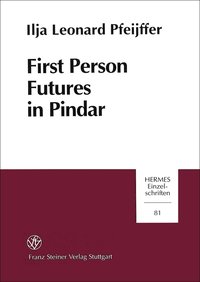
This book is about passages where Pindar uses the future tense with reference to himself or to his song. It addresses the question as to exactly what the function is of the future tense in those passages. This is a vexed problem, which has played a major role in Pindaric criticism for the last decades and which has recently gained relevance for the interpretation of other authors as well. This book offers a detailed examination of all the relevant passages in Pindar, as well as a generous amount of examples from other authors. It takes a firm stand against the communis opinio that first person futures in Pindar merely express a present intention: the so-called "encomiastic" or "performative" future. It demonstrates that the reference to a future moment is relevant in every single instance of a future verb in Pindar and concludes that there is no such thing as an "encomiastic" future. Inhalt: Futures with a text internal reference – Futures referring to a later moment in the ode – "Fictional" futures – Generic futures – Futures with a specific text external reference – The case of Olympian XI – First person futures in Theocritus' second Idyll & magical texts